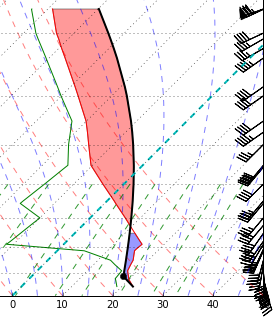.. toctree:: :maxdepth: 1 :hidden: installguide startingguide units examples/index Python Gallery (separate site) <https://unidata.github.io/python-training/gallery/gallery-home> tutorials/index api/index roadmap gempak SUPPORT CONTRIBUTING infrastructureguide citing references
MetPy is a collection of tools in Python for reading, visualizing, and performing calculations with weather data. If you're new to MetPy, check out our :doc:`Getting Started <startingguide>` guide. Development is supported by the National Science Foundation through grants AGS-1344155, OAC-1740315, AGS-1901712.
For additional MetPy examples not included in this repository, please see the Unidata Python Gallery.
We support Python >= 3.6. Support for Python 2.7 was dropped with the release of 0.12.
- For questions about MetPy, please ask them using the "metpy" tag on StackOverflow. Our developers are actively monitoring for questions there.
- You can also email Unidata's python support email address
- The source code is available on GitHub
- Bug reports and feature requests should be directed to the GitHub issue tracker
- MetPy has a Gitter chatroom for more "live" communication
- MetPy can also be found on Twitter
- If you use MetPy in a publication, please see :ref:`Citing_MetPy`.
- For release announcements, join Unidata's python-users mailing list
MetPy follows semantic versioning in its version number. This means
that any MetPy 1.x release will be backwards compatible with an earlier 1.y release. By
"backward compatible", we mean that correct code that works on a 1.y version will work
on a future 1.x version. It's always possible for bug fixes to change behavior or make
incorrect code cease to work. Backwards-incompatible changes will only be allowed when changing
to version 2.0. Such changes will be proceeded by MetpyDeprecationWarning or
FutureWarning as appropriate. For a version 1.x.y, we change x when we
release new features, and y when we make a release with only bug fixes.
- AMS 2019 talk on bringing GEMPAK-like syntax to MetPy's declaritive plotting interface
- AMS 2019 poster on recent development and community building with MetPy
- SciPy 2018 poster and abstract on building community by John Leeman
- SciPy 2018 talk on prototyping MetPy's future declarative plotting interface
- Presentation on MetPy and Community Development at the 2018 AMS Annual Meeting by Ryan May
- SciPy 2017 poster and repository about reproducing a classic CAPE paper with MetPy.
- SciPy 2017 talk and slides about challenges developing MetPy with units
- MetPy was featured on Episode 100 of Podcast.__init__
- Presentation on MetPy's build infrastructure by Ryan May at SciPy 2016
- MetPy was included in tools presented at the SSEC/Wisconsin AOS Python Workshop
- Presentation on MetPy at the 2016 AMS Annual Meeting by Ryan May
- Ryan May's talk and tutorial on MetPy at the 2015 Unidata Users Workshop
MetPy is available under the terms of the open source BSD 3 Clause license.
We want everyone to feel welcome to contribute to MetPy and participate in discussions. In that spirit please have a look at our code of conduct.
- netCDF4-python is the officially blessed Python API for netCDF
- siphon is a Python API for accessing remote data on THREDDS Data Servers
- The Unidata Python Gallery is a collection of meteorological Python scripts


